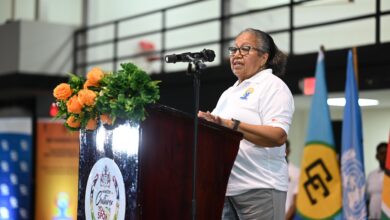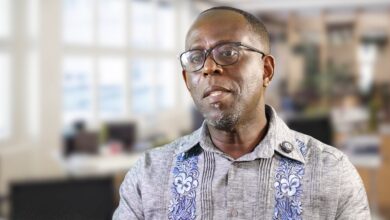Caribbean Launch of UNAIDS- Lancet Commission Report Defeating AIDS-Achieving sustainable health Address by Prime Minister St Kitts- Nevis, Hon Dr. Timothy Harris, CARICOM Lead Head for Human Resources Health and HIV
The UNAIDS-Lancet Report is indeed the high level analysis based on empirical evidence. It makes us deeply aware that this disease HIV and AIDS is far from over. At the same time it provides the options from grasping opportunities to end this epidemic by 2030.
It is clear from the Report that we in the Caribbean, more than most other regions in the World—especially the developing world — are on a fast track to realize this aspirational goal of ending AIDS by 2030 The evidence shows that the achievements of the Caribbean include:
• A 52 percent decline in HIV infections among children between 2001 and 2012, due to 90 percent of pregnant women living with HIV receiving services to prevent mother-to-child-transmission;
• A 49 percent decline in HIV incidence over the past decade
• Reduced HIV prevalence from 1.5percent in 2002 to 1.0 percent in 2012;
• Rolled out of antiretroviral treatment to 70 percent of those eligible, resulting in a major reduction in deaths due to AIDS and improved quality of life for people living with HIV; • Decreased HIV prevalence among female sex workers in several Caribbean countries;
• Strengthened health systems and scaled-up of prevention, treatment, care and support services;
• Substantial returns on investments from internal and external sources; and
• Provision of regional public goods and services creating more affordable access to medicines and shared capacity in key areas.
Most of all, based on current trends, the Caribbean region is poised to becoming the first region in the world to eliminate mother-to-child of HIV
Lessons from this report warm that we cannot be complacent:
o We must combine biomedical , behavior and structural interventions , especially to reduce poverty , reduce inequity and increase environmental and financial sustainability
o We must focus on populations at higher risks: especially our girls and young women, men who have sex with men and commercial sex workers
o We must focus on equality in treatment and prevention: leaving no one behind
o We must eliminate HIV related stigma and discrimination which fan the flames of this disease
o We need to integrate HIV services with other health services
As CARICOM Lead Head for Human Resources , Health and HIV , I wish to work with partners within the government and non-governmental system, the private sector , the people living with HIV and the development agencies to achieve the outcomes for making the Caribbean the first region to end the AIDS epidemic. This Report points us in the direction toward:
o Finding the formula for investments in treatment and prevention that make the greatest difference.
o Targeting the marginalized populations and those most at risk of the HIV infection
o Securing long term supplies of affordable first, second and third line anti-retroviral treatment
o Scaling up funding by building on the model of the Global Fund for AIDS TB and Malaria (GFATM) and applying it to integrated and sustainable health. This could include also a Caribbean Sustainable Health and equity fund
o Providing accurate and up to date epidemiological data for the Region and disseminating them in a timely manner to shape policy ,
o Pacing emphasis on transparency, accountability through procedures for monitoring and evaluation
It is clear that while Caribbean Countries must continue to reduce their dependency on external sources of financing, they must also continue to:
o lobby for breaking down the barriers of discrimination in funding HIV and other diseases based solely on the criteria of our middle and upper middle income status
o Lobby for making access to affordable medicines a human rights
o Lobby for shared responsibility among governments, private sector and civil society
o Lobby for HIV and sustainable health to be considered within the strategies for investing for development now engaging the world
It is also clear that Caribbean countries must continue to confront the issues that are related to the elimination of stigma and discrimination and disentangle them from the misperception that this is a gay agenda. We have to move forward with the engagement of all sectors including parliamentarians, faith leaders, the private sector, youth and civil society The Caribbean has already established some new paths to human rights by
o recognizing the cultural norms of our societies that place emphasis on promoting family values and helping those in need,
o recognizing that the need for a multisectoral approach to behavior change,
o Investing in research to influence evidence based policy
o establishing that the leadership best capable of catalyzing this change must a collective one that ensures the engagement of people living with HIV.
As we grasp the opportunities that beckon us in the post 2015 development era the Caribbean has to focus the conversation on what can the various sectors and partners do to end the AIDS epidemic by 2030






